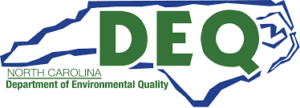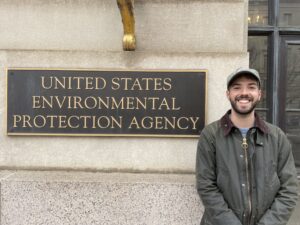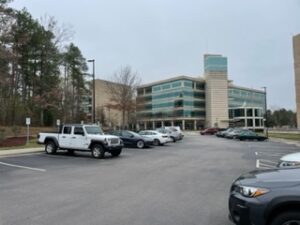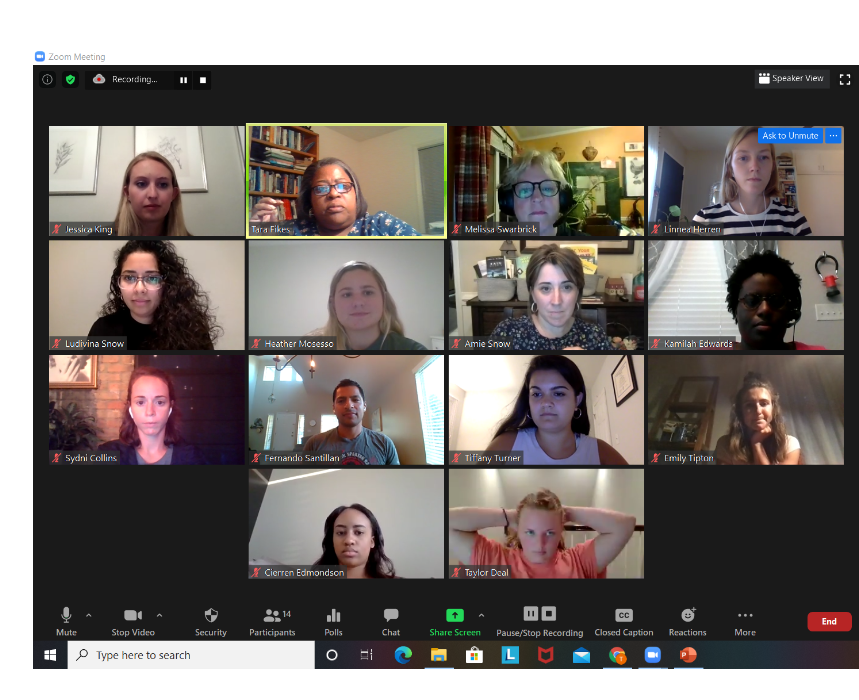This post was written by current MPA student Stephen Thompson

Keeping up with the local news is something that’s always been important to me, and my time in the MPA program has only solidified that commitment. The values and concepts in the program are helping me to see the news within my community through different lens and from new perspectives. Using concepts taught in the program such as the competing values of public service and the public private dichotomy, I’m starting to ponder questions, which I hadn’t considered before. For example:
There is a new church opening on the northside of downtown Durham this winter called Pioneer Church. Taking a somewhat unique approach to sanctuary this church will function as a community space/store/coffee shop during the week and transform its storefront area to a place of worship on the weekends. This new organization is getting a lot of attention for its choice of “up and coming” neighborhood, and its stance on LGBTQ+ rights (Indyweek released a very informative article last week HERE). The church has announced that the storefront portion of the business will be separate from the religious organization, and only the church will be tax free (presumably responding to community grumblings) but this actually raises a recurring, but still very important question for public servants: Should churches still be tax-exempt in 2021?
Public Service is a multi-faceted discipline (just ask Dr. Stenberg, shoutout to PUBA 709) but one of the basic concepts is that of the competing values of Liberty, Community, Prosperity, and Equality. These values are two sets of diametrically opposed values which are fundamental frames through which public issues are viewed. Liberty—freedom, choice, and individuality; Community—safety, security, and social order; Prosperity—Efficiency, Economy, and productivity and Equality—equity, fairness, and justice. These competing values exist on opposite ends of two spectrums. The further you move toward community, the further you move away from Liberty. The more regulation that is put in place to protect equality, the less prosperity (on an individual level) is felt. Any given public issue does not necessarily engage all four values; however, every public issue does involve at least two opposing values. Whether its speed limits on highways, or food safety regulations on prepackaged food, these values are battled out from small, townhall meetings to the floor of the capital building in Washington, DC.
The question of whether or not churches should be given tax-exempt status, actually touches on all four of these competing values. At one end you have the equality aspect. This country was founded on and continues to defend religious freedom, and separation of church and state. Therefore, if you give one church/religious order tax exempt status, you have to give it to all churches. If you turn the other check though, church coffers represent an enormous amount of untaxed revenue which could be quite prosperous for American citizens though public services. Certainly, no member of any church wants Uncle Sam to skim off a portion of their sacred offering/donation, however collectively speaking this is a large source of income which is off limits to state and federal governments. This “godsend” (so to speak) could be used to fund public services enjoyed by members of all faiths (or even non-practicing individuals all together). Looking at it from the secondary perspective, individuals do have the right to worship how and wherever they please in this county. That’s a God-given liberty (I’m full of puns), but with so many forms and denominations of religion in this country, perhaps social order might dictate that since no one church has special privileges over others, maybe no churches shouldn’t get special privileges, at all.
I’m not necessarily arguing that churches shouldn’t receive tax-exemptions; many of them do contribute to the public good by funding homeless services or operating food pantries, etc. After all, secular nonprofit organization such as the Arts Council I work for are afforded tax-exemption for the public good they serve. These are examples of the public-private dichotomy, organizations which are privately run but provide services which support the public good. Regardless of the conclusions, I do think that decisions for and by the public should be reconsidered every few years. As citizens, we have a duty of conservatorship of our county, and routinely checking in on our traditions and long running practices is a chore we often forget. Our law books are bloated with outdated codes, and long since irrelevant laws, however many of these wouldn’t have the significant effects on public services which reconsidering the tax-exempt status of churches would on our communities, both locally and nationally. So, whether it’s a new spot in the neighborhood, or mega church in the Midwest, it’s worth a discussion about how we as a community of citizens want to allocation our limited resources. Not a sermon, just thought (from an MPA student).









 Breaking this down we can see how this question of “what can and what can’t teachers tell children?” lands in all four areas. Liberty; Everyone should be able to say whatever they want, using their own personal discretion as to what is and isn’t appropriate for the situation. Community; but maybe what doesn’t offend me, is downright vulgar to you, so maybe let’s agree on some basic standards. Prosperity; in order for children to succeed they need the best education for them, which may include parents and guardians teaching some topics in more intimate environments. Equality; on the other hand, maybe we should lay some basic groundwork down to ensure everyone knows at least the bare minimum on commonly discussed topics. [Wow, that was a head jerker].
Breaking this down we can see how this question of “what can and what can’t teachers tell children?” lands in all four areas. Liberty; Everyone should be able to say whatever they want, using their own personal discretion as to what is and isn’t appropriate for the situation. Community; but maybe what doesn’t offend me, is downright vulgar to you, so maybe let’s agree on some basic standards. Prosperity; in order for children to succeed they need the best education for them, which may include parents and guardians teaching some topics in more intimate environments. Equality; on the other hand, maybe we should lay some basic groundwork down to ensure everyone knows at least the bare minimum on commonly discussed topics. [Wow, that was a head jerker]. 



 I am working with the North Carolina Business Committee for Education (NCBCE) to fulfill my PWE hours for the MPA program. NCBCE is a non-profit organization that operates out of the Office of the Governor and serves as link for North Carolina employers and the education system. NCBCE invests significant time and resources to develop and promote work-based learning initiatives in North Carolina. In early 2020, pre-pandemic and before our lives changed, NCBCE, in partnership with the North Carolina Community Colleges, the Office of the Governor, myFutureNC, and the state Division of Workforce Solutions, launched NC Career Launch—an effort to increase post-secondary attainment and connect students to jobs in high-demand fields. Unfortunately, the pandemic interrupted the initiative’s momentum. I am working with the Executive Director of NCBCE to elevate NC Career Launch and restore the pre-pandemic momentum. One way we are working to accomplish this goal is by developing youth apprenticeship programs to pilot under NC Career Launch.
I am working with the North Carolina Business Committee for Education (NCBCE) to fulfill my PWE hours for the MPA program. NCBCE is a non-profit organization that operates out of the Office of the Governor and serves as link for North Carolina employers and the education system. NCBCE invests significant time and resources to develop and promote work-based learning initiatives in North Carolina. In early 2020, pre-pandemic and before our lives changed, NCBCE, in partnership with the North Carolina Community Colleges, the Office of the Governor, myFutureNC, and the state Division of Workforce Solutions, launched NC Career Launch—an effort to increase post-secondary attainment and connect students to jobs in high-demand fields. Unfortunately, the pandemic interrupted the initiative’s momentum. I am working with the Executive Director of NCBCE to elevate NC Career Launch and restore the pre-pandemic momentum. One way we are working to accomplish this goal is by developing youth apprenticeship programs to pilot under NC Career Launch.